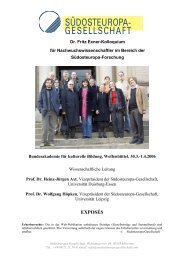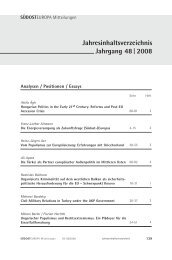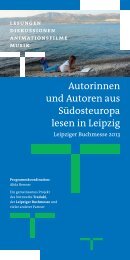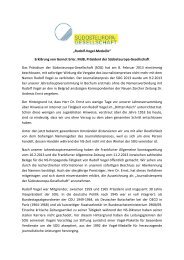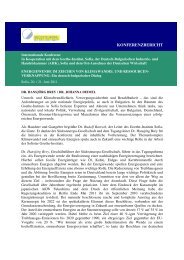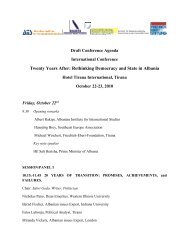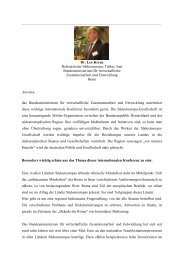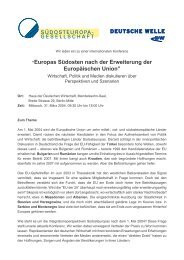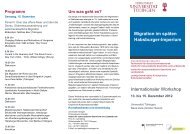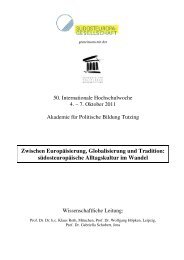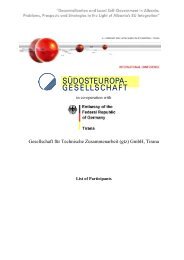SÃDOST EUROPA Mitteilungen - Suedosteuropa Gesellschaft
SÃDOST EUROPA Mitteilungen - Suedosteuropa Gesellschaft
SÃDOST EUROPA Mitteilungen - Suedosteuropa Gesellschaft
You also want an ePaper? Increase the reach of your titles
YUMPU automatically turns print PDFs into web optimized ePapers that Google loves.
SÜDOST <strong>EUROPA</strong><br />
<strong>Mitteilungen</strong><br />
03 2012 52. Jahrgang<br />
SÜDOST<strong>EUROPA</strong> <strong>Mitteilungen</strong> 03 2012<br />
Main Focus:<br />
War Crimes and Transitional Justice<br />
in Former Yugoslavia<br />
Christian Axboe Nielsen<br />
Fergal Gaynor<br />
Katarina Ristić<br />
Anisa Sućeska-Vekić<br />
Dejan Jović<br />
Elena Panagiotidis<br />
War Crimes and Organized Crime<br />
in Former Yugoslavia<br />
ICTY: Achievements and Challenges<br />
War Crime Trials and Society<br />
in Former Yugoslavia<br />
War Crime Trials in<br />
Bosnia and Herzegovina<br />
Discourse on the “Homeland War”<br />
in Contemporary Croatia<br />
Die Radikalisierung der<br />
griechischen Parteienlandschaft<br />
Herbert Küpper<br />
Ungarns neues Grundgesetz von 2011<br />
Lindita Arapi<br />
Schwarz-Rote Allianz für ein<br />
neues oder ein Groß-Albanien?
Inhalt<br />
03 2012 52. Jahrgang<br />
Analysen / Positionen / Essays<br />
Main Focus:<br />
War Crimes and Transitional Justice in Former Yugoslavia<br />
6 Christian Axboe Nielsen<br />
The Symbiosis of War Crimes and Organized Crime in the<br />
Former Yugoslavia<br />
18 Fergal Gaynor<br />
Prosecution at the ICTY: Achievements and Challenges<br />
32 Katarina Ristić<br />
Silencing Justice: War Crime Trials and the Society in Former<br />
Yugoslavia<br />
44 Anisa Sućeska-Vekić<br />
War Crime Trials in Bosnia and Herzegovina: Achievements<br />
and Challenges<br />
52 Dejan Jović<br />
The War That Is Not Allowed to Be Forgotten: Nationalist<br />
Discourse on the “Homeland War” (1991-1995) in<br />
Contemporary Croatia
03 2012<br />
70 Elena Panagiotidis<br />
Die Radikalisierung der griechischen Parteienlandschaft –<br />
Griechenland nach den Parlamentswahlen am 6. Mai 2012<br />
80 Herbert Küpper<br />
Ungarns neues Grundgesetz von 2011 – Kein Grund zum<br />
Jubel, aber auch noch nicht das Ende der Demokratie<br />
102 Lindita Arapi<br />
Eine Schwarz-Rote Allianz für ein neues oder ein Groß-<br />
Albanien?<br />
Berichte<br />
111 War Crimes and Transitional Justice in the Former Yugoslavia:<br />
15 Years of Experience. Leipzig, 22.-24. März 2012<br />
118 Versöhnung auf dem Balkan – rechtliche und politische Fragen /<br />
Reconciliation on the Balkans – Legal and Political Questions. Berlin,<br />
27. Januar 2012<br />
122 12. goEast-Festival des mittel- und osteuropäischen Films.<br />
Wiesbaden, 18.-24. April 2012<br />
125 Rezensionen<br />
J. Rücker: Standards and Status – How Kosovo Became Independent<br />
A. Wittkowsky: Grand Hotel Kosovo – Schlaglichter einer europäischen Staatsbildung<br />
D. Šimko / U. Mäder (Eds.): Stabilization and Progress in the Western Balkans<br />
G. Müller-Brandeck-Bocquet / C. Rüger (Eds.): The High Representative for the EU<br />
Foreign and Security Policy – Review and Prospects O. Leiße (Hrsg.): Reformen<br />
für Europa – Herausforderungen für die europäische Integration S. Schüler<br />
(Hrsg.): Politische Kultur in (Südost-) Europa – Charakteristika, Vermittlung, Wandel
Editorial<br />
Sehr geehrte Leserin, sehr geehrter Leser,<br />
die Festnahme der letzten, vom Internationalen Strafgerichtshof für das ehemalige<br />
Jugoslawien (ICTY) angeklagten, mutmaßlichen Kriegsverbrecher im Sommer 2011 war ein<br />
bedeutender Teilerfolg bei dem Versuch, den Opfern der Kriegsverbrechen in den Kriegen im<br />
ehemaligen Jugoslawien Gerechtigkeit widerfahren zu lassen. Ende 2014 soll der ICTY<br />
geschlossen werden. Der Themenschwerpunkt in diesem Heft der Südosteuropa <strong>Mitteilungen</strong><br />
bilanziert die Erfahrungen, Erfolge und Rückschläge von anderthalb Jahrzehnten Implementierung<br />
eines „Übergangsrechts“ in den Nachfolgestaaten des ehemaligen Jugoslawiens. Die<br />
hier – in englischer Sprache – veröffentlichten Beiträge sind Ergebnisse einer internationalen<br />
Konferenz zum Thema „War Crimes and Transitional Justice in the Former Yugoslavia:<br />
15 Years of Experience“, welche die Südosteuropa-<strong>Gesellschaft</strong> vom 22. bis 24. März 2012<br />
in Kooperation mit der Universität Leipzig im Neuen Senatssaal der dortigen Universität veranstaltete.<br />
Die Konferenz, wie auch die Publikation der Beiträge in diesem Heft, wurden<br />
ermöglicht durch die Unterstützung des Auswärtigen Amts aus Mitteln des Stabilitätspakts für<br />
Südosteuropa. Die Auswahl der Beiträge versucht, möglichst vielfältige Facetten des Themas<br />
zu erfassen. Dazu gehören eine kritische Bilanz des ICTY, der Umgang mit Kriegsschuld und<br />
Kriegsverbrechen in Bosnien-Herzegowina, Kroatien und Serbien sowie auch die diffusen<br />
Übergänge zwischen Kriegsverbrechen und organisiertem Verbrechen als schwere Belastung<br />
für die Rechtsstaatlichkeit in den jugoslawischen Nachfolgestaaten. Einen Überblick über die<br />
Themen und Diskussionen der Leipziger Konferenz gibt ein ausführlicher Tagungsbericht in<br />
diesem Heft (eine englische Version finden Sie unter www.sogde.org).<br />
Unser Schwerpunkt wird ergänzt von weiteren deutschsprachigen Beiträgen zu höchst<br />
aktuellen Fragen der politischen und gesellschaftlichen Entwicklung in Südosteuropa. Themen<br />
sind hier die Radikalisierung der Parteienlandschaft in Griechenland, das – viel kritisierte –<br />
neue ungarische Grundgesetz von 2011 sowie die „Schwarz-Rote Allianz“, eine junge politische<br />
Bewegung in Albanien.<br />
Eine erkenntnisreiche Lektüre wünscht<br />
Ihr Redaktionsteam<br />
Hansjörg Brey<br />
Claudia Hopf
Editorial<br />
Dear Reader,<br />
the arrest of the last alleged war criminals in the summer of 2011 who were accused by the<br />
International Criminal Tribunal for the Former Yugoslavia (ICTY) was a major success in the<br />
attempt to provide justice for the victims of the war crimes committed during the wars in<br />
former Yugoslavia. The ICTY is supposed to be closed down at the end of 2014. The main focus<br />
covered in this issue of the “Südosteuropa <strong>Mitteilungen</strong>” sums up the experiences, successes<br />
and setbacks of one and a half decades with reference to the implementation of “transitional<br />
justice” in the successor states of former Yugoslavia. The articles that are published in English<br />
are the results of an international conference on „War Crimes and Transitional Justice in the<br />
Former Yugoslavia: 15 Years of Experience“, which had been organized by the Southeast Europe<br />
Association on 22-24 March 2012 in cooperation with the Leipzig University in the Senate hall<br />
of the university. The conference, as well as the publication of the articles released in this<br />
volume, was rendered possible with the support of the German Federal Foreign Office using<br />
funds of the Stability Pact for South Eastern Europe. The selection of the contributions tries to<br />
cover a multitude of aspects concerning the topic. This includes a critical analysis of the ICTY,<br />
the reflection of war guilt and war crimes in Bosnia-Herzegovina, Croatia and Serbia, as well as<br />
the ambivalent transition between war crimes and organized crime constituting a heavy<br />
burden for the rule of law in the Yugoslavian successor states. An outline of the topics and<br />
discussions covered during the conference in Leipzig is provided by a detailed conference<br />
report in this volume (for an English version see www.sogde.org).<br />
The main focus of this volume is supplemented by further articles in German language covering<br />
highly topical questions referring to the political and social developments in Southeast Europe.<br />
The articles highlight the radicalization of the political parties in Greece, the – much criticized –<br />
new Hungarian Constitution of 2011 as well as the “Black-Red Alliance”, a newly developed<br />
political movement in Albania.<br />
With the best wishes for a valuable reading,<br />
Your editorial team<br />
Hansjörg Brey<br />
Claudia Hopf
SÜDOST<strong>EUROPA</strong><br />
<strong>Mitteilungen</strong><br />
Zeitschrift der Südosteuropa-<strong>Gesellschaft</strong><br />
Summaries Heft 03/2012<br />
52. Jahrgang<br />
Main Focus: War Crimes and Transitional Justice in Former Yugoslavia<br />
Christian Axboe Nielsen<br />
The Symbiosis of War Crimes and Organized Crime in the Former<br />
Yugoslavia<br />
Although the focus in both academic research and international criminal prosecutions<br />
related to the recent wars in the former Yugoslavia has been on war crimes, these<br />
cannot be fully understood without studying their relationship to organized criminal<br />
conduct.<br />
By considering the history of the security services in Yugoslavia’s last decades, it is<br />
possible to detect troubling antecedents for the engagement of criminal elements by<br />
the state concerning the destruction of the country. Opportunistic and nationalist<br />
elites devised a strategy of using paramilitary organizations to ethnically cleanse<br />
opponents in order to establish homogenous nation-states. In the short term, this<br />
strategy proved catastrophically effective, but it carried with it a large number of<br />
negative externalities that undermined democracy, the rule of law and market<br />
economics in the newly independent states.<br />
Fergal Gaynor<br />
Prosecution at the ICTY: Achievements and Challenges<br />
The article examines some of the principal achievements of, and challenges faced<br />
by, the Office of the Prosecutor (“OTP”) of the International Criminal Tribunal for the<br />
Former Yugoslavia (“ICTY” or “Tribunal”) in The Hague.<br />
As achievements, it mentions the impressive body of jurisprudence generated in a<br />
relatively short period, as well as innovative procedural solutions developed to<br />
address unique situations. It also cites the opportunities given to thousands of victims<br />
to testify about the facts of their ordeals in a dignified environment.<br />
It argues that the greatest success of the OTP is perhaps that it did not fail. Some of<br />
the greatest challenges faced by the OTP have been: having accused persons<br />
arrested; getting access to documentary evidence held by recalcitrant states;<br />
ensuring that the pre-trial and trial periods are expeditious; self-representation;<br />
explaining the benefits of witness proofing and plea agreements to sometimes<br />
sceptical observers.
2<br />
Katarina Ristić<br />
Silencing Justice: War Crime Trials and the Society in Former<br />
Yugoslavia<br />
The article examines political and media discourses on war crime trials in former<br />
Yugoslavia and their relation to transitional justice norms. The main aim is to explain<br />
the modest results of the ICTY in triggering the process of dealing with the past in the<br />
region.<br />
Discourse analysis has been utilized to analyze about 5000 articles published in<br />
Croatia, Bosnia and Herzegovina as well as Serbia in the period 2001-2011. The<br />
study shows that the three countries constructed a significantly different memory of<br />
war crime trials, mainly in accordance with the claims of dominant ethno-nationalist<br />
discourses. In Serbia, the trials are seen as yet another tool used by the international<br />
community to victimize and humiliate Serbia. In Bosnia, war crime trials are a<br />
confirmation of the genocide narrative and the status of the war’s greatest victims.<br />
Finally, in Croatia, the war crime trials are accepted only to the extent they confirm<br />
the “Homeland War” narrative.<br />
Interpreted solely in an ethno-nationalist frame, war crime trials could so far not<br />
contribute significantly to reconciliation and dealing with the past, but they did<br />
provoke debates and provided a challenge for dominant war narratives throughout<br />
the region.<br />
Anisa Sućeska-Vekić<br />
War Crime Trials in Bosnia and Herzegovina: Achievements and<br />
Challenges<br />
More than a decade after the end of the war, Bosnia and Herzegovina (BiH) is still<br />
struggling to overcome the ensuing injustice and setbacks. Fears among the three<br />
ethnicities are rooted in the communities while the culture of collective blame prevails<br />
in the country.<br />
BiH has perhaps the most layered and complex arrangement for prosecuting<br />
perpetrators of grave violations of international humanitarian law, having established<br />
a great range of institutions. There is a strong public debate going on among relevant<br />
stakeholders whether the different courts demonstrate ample capacity, willingness<br />
and professionalism to fairly and efficiently examine war crime cases, free of any<br />
indication of ethnic bias.<br />
Public confidence in war crime proceedings is fragile and widespread distrust in the<br />
institutions is still a feature in the BiH society. Misunderstandings emanating from<br />
judicial proceedings can actually exacerbate societal tensions and contribute to<br />
escalation of political strife which has been happening in Bosnia and Herzegovina in<br />
the past decade, especially after the political crisis started in 2007. Local judiciary is<br />
facing strong political influence, not only directly but also through the corrupt media<br />
stakeholders.<br />
Despite of the challenges, the justice – dealing with the past and paths to<br />
reconciliation – should be among the primary issues of concern for each citizen of<br />
Bosnia and Herzegovina, regardless of gender, age or ethnicity.
3<br />
Dejan Jović<br />
The War That Is Not Allowed to Be Forgotten: Nationalist Discourse<br />
on the “Homeland War” (1991-1995) in Contemporary Croatia<br />
The article focuses on the analysis of the dominant discourse on the Croatian<br />
“Homeland War” (1991-1995) as developed within the contemporary doctrine of<br />
Croatian nationalism. The character of Croatian nationalism is predominantly<br />
conservative, and thus the official interpretation of previous wars is founded on<br />
conservative ideology. The essence of this interpretation is in celebrating, rather than<br />
commemorating the war that was rather successful for Croatian nationalism. Croatian<br />
nationalism has achieved three major objectives in this war: It succeeded in taking<br />
Croatia out of Yugoslavia, it secured territorial integrity for the newly independent<br />
Republic of Croatia, and it made Croatia more ethnically homogeneous than ever<br />
before.<br />
Croatian nationalism had a good war. The author argues that this is the reason why<br />
conservative nationalists do not allow the “Homeland War” to be forgotten. In<br />
addition, they also keep official memories of the Second World War alive, and use<br />
these “memories” primarily to argue that Croatian history prior to the 1990s was<br />
tragic. The leading nationalist politicians reject any challenge of the official discourse<br />
as an attempt of historical revisionism. This narrative is still able to mobilise voters,<br />
albeit not to the extent as was the case in the 1990s. However, the anti-nationalists<br />
are trying to ignore it. They hope that the fate of the nationalist discourse will be the<br />
same as the fate of Marxist ideology.<br />
Elena Panagiotidis<br />
The Radicalisation of the Greek Political Landscape<br />
Greece after the Parliamentary Election of 6 May 2012<br />
The Greek parliamentary elections of 6 May 2012 have marked the end of the<br />
traditional two-party-system dominating Greek politics since 1974. They proved that<br />
Greece’s political landscape has radicalized. Conservative Nea Dimokratia (ND) won<br />
the polls but marginally failed to achieve the number of votes needed to form an<br />
outright majority in parliament. Socialist PASOK – being considered the main culprit<br />
for Greece’s financial situation – placed a distant third. The radical leftist party Syriza<br />
that renounces the Troika’s bailout memorandum is now a major player on the scene<br />
and might become something like the “new PASOK”.<br />
One of the topics dominating the electoral campaign prior to 6 May 2012 was<br />
(irregular) migration to Greece. The fascist party Chryssi Avgi (Golden Dawn) made it<br />
its priority, but PASOK and ND were also fishing in the far right vote, thus contributing<br />
to poisoning the climate in Greek society. While in the electoral period before May 6 th<br />
parties were divided between those in favor of the bailout-program and those<br />
renouncing it, in the period before the next elections on 17 June 2012 all parties have<br />
been distancing themselves from the memorandum and its harsh austerity measures.
4<br />
Herbert Küpper<br />
Hungary’s New Constitutional Law of 2011<br />
No Reason for Exaltation, But Not the End of Democracy, Either<br />
Hungary's Constitution of 25 April 2011 has given rise to many debates both within<br />
Hungary and its European partner countries. These debates are fuelled by political<br />
emotions and, in the media outside Hungary, quite often by misunderstandings or<br />
one-sided information. Reliable and fact-based knowledge, however, is rare.<br />
The article describes the new Constitution, discusses the items that were criticised in<br />
the Western media in a comparative perspective, and problematizes the debatable<br />
aspects of the Constitution that were not a topic of Western criticism. It shows that<br />
the text of the Constitution abolishes neither democracy nor the rule of law, but<br />
contains – apart from "fashionable" developments such as a "sustainable<br />
development" – some potentially illiberal parts and certain rules that, due to their<br />
vagueness, may open ways for abuse.<br />
Lindita Arapi<br />
A Black-Red-Alliance for a New Albania or a Greater Albania?<br />
A new political party in Albania is presently attracting the attention in Albania, Kosovo<br />
and Macedonia. The Black-Red-Alliance (AK), named after the colours of the national<br />
Albanian flag, brings turmoil to the Albanian political landscape.<br />
The AK started its political life as a regular Albanian party in March 2012 by attacking<br />
all major politicians, as they failed in advancing Albania’s EU-integration process. AK<br />
presents itself as the new hope for all Albanians wherever they may live and meets a<br />
positive reaction. Moreover, it is especially the nationalistic demand for the unification<br />
of Albania and Kosovo that causes further major discussions in the Albanian public<br />
opinion.<br />
Is AK a real nationalistic danger in the southern Balkans or simply a new Albanian<br />
party looking for its electorate?



